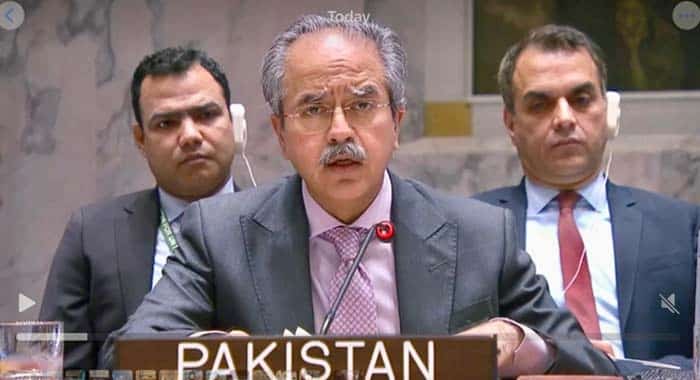Pakistan has warned that militant groups operating from Afghanistan pose a grave threat to its national security as well as to regional and international stability, identifying the Tehreek-e-Taliban Pakistan (TTP) as the most immediate danger. Speaking at a UN Security Council meeting on Wednesday, Pakistan’s Permanent Representative to the UN, Asim Iftikhar Ahmad, underscored that the TTP remains the country’s foremost security challenge. He noted that the group maintains an estimated strength of 6,000 fighters and has developed operational linkages with Baloch separatist organisations, including the Balochistan Liberation Army (BLA), to carry out attacks on strategic targets inside Pakistan.
“The threat emanating from Afghanistan is not confined to Pakistan’s borders but also endangers international security,” Ahmad told the Council, which convened to review the UN secretary-general’s latest report on the threat posed by the Islamic State group.
Council members expressed similar concerns, warning that ISIS-Khorasan (ISIS-K) continues to represent a serious threat in Afghanistan, Europe, and Central Asia. According to UN assessments, the group currently commands a fighting force of around 2,000 militants.
Ahmad said terrorism “within and from Afghanistan is the single most potent threat to that country, to the region, and the world.” While acknowledging that the Taliban authorities were engaged in fighting ISIS-K, he stressed that groups such as the TTP and armed Baloch insurgents continue to exploit ungoverned spaces in Afghanistan to plan and conduct cross-border operations.
The envoy further accused India of sponsoring terrorism inside Pakistan, alleging that New Delhi provides financial and logistical support to proxy groups in the region. India has repeatedly rejected such allegations.
Pakistan has consistently maintained that the Afghan Taliban are providing safe havens to TTP fighters. The Taliban, however, deny the charge, insisting that Afghan soil will not be allowed to be used against any country.
Earlier this month, Pakistan’s Foreign Ministry reiterated that Baloch insurgents and TTP militants were receiving financial and logistical backing from within Afghanistan and called on the Taliban government to take “decisive action” against these groups.
A recent report by UN experts also cited the presence of several al-Qaeda-linked training facilities in Afghanistan, including three newly identified sites where both al-Qaeda and TTP fighters are reportedly undergoing training.
The renewed warnings come as Pakistan continues to press the international community to take notice of terrorist safe havens in Afghanistan, stressing that these threats, if left unaddressed, could destabilise not only the region but also international peace and security.





